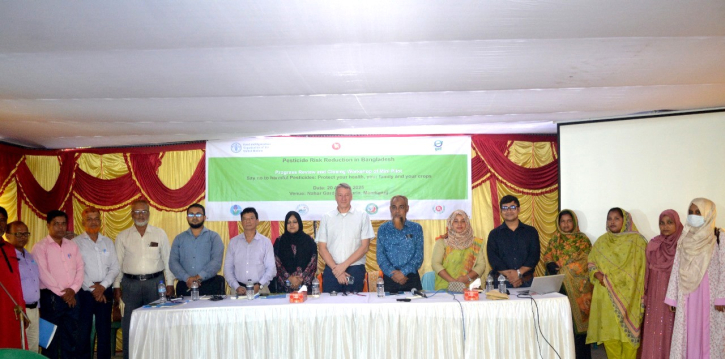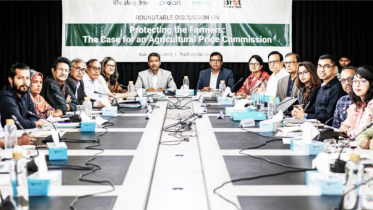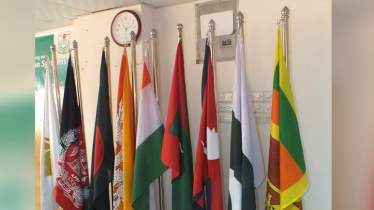
The Food and Agriculture Organization of the United Nations (FAO) has successfully completed its Mini Pilot program on the collection, storage, and disposal of empty pesticide containers in Saturia, Manikganj. The program concluded with a closing workshop at Nahar Garden on 20 August 2025.
The initiative was implemented under FAO’s Global Environment Facility (GEF)-funded Pesticide Risk Reduction in Bangladesh project, launched in November 2024. It aimed to address the growing environmental and health risks caused by the improper disposal of hazardous pesticide packaging waste. Focusing on voluntary collection and disposal of Primary Pesticide Packaging Waste (PPPW), the pilot collected a total of 1.36 tons of pesticide packaging waste over the course of eight months.
The event was graced by Martijn Van De Groep, Senior Technical and Policy Advisor, FAO Bangladesh, and Dr. Robiah Noor Ahmed, Deputy Director, Department of Agriculture Extension (DAE), Manikganj, while Mst. Tania Tabasum, Upazila Agriculture Officer, DAE, Saturia, chaired the session.
With the rapid adoption of high-yielding and hybrid crop varieties in Bangladesh, alongside a growing focus on high-value fruits and vegetables, pesticide demand has risen significantly. To mitigate the risks of unsafe disposal, the Mini Pilot raised awareness among farmers and pesticide dealers, encouraging voluntary collection and safe storage of containers at designated points. The initiative contributed to environmental protection by reducing groundwater contamination, safeguarding wildlife, minimizing air pollution, supporting recycling, and promoting ecosystem balance—ultimately protecting farmers’ health and ensuring food safety.
Martijn Van De Groep emphasized the importance of a sustainable disposal system for agricultural waste. “For the last eight months FAO has been working with the Department of Agriculture Extension to promote safe farming practices among farmers and pesticide dealers in Saturia. We also helped them implement those practices in real life by providing protective equipment and piloting a system to successfully dispose of hazardous pesticide packaging wastes. Now that the Mini Pilot initiative comes to an end, we look forward to collaborating with DAE and relevant private sector partners to continue the effort with the lessons learnt,” he said.
The pilot was designed not only to dispose of pesticide waste but also to establish the foundation for a national system of responsible pesticide waste management. Insights from the project are expected to help the Government of Bangladesh and industry stakeholders develop a safe and sustainable nationwide model.
Dr. Robiah Noor Ahmed, Deputy Director, DAE, highlighted the urgency of stronger oversight in pesticide use. “Responsible pesticide use is key to food safety, sustainability, and farmer health, but poor selling practices still pose risks. Stronger monitoring, education, and compliance are necessary now. A paid collection system is already helping with safe waste disposal. With reduced residues, Bangladesh can boost agricultural exports. Through awareness and innovation, we can secure a healthier, more prosperous future,” she said.
Since November 2024, FAO and DAE officials have trained more than 1,300 farmers, 100 pesticide dealers, and 30 Sub-Assistant Agriculture Officers (SAAOs) on safe handling and disposal of pesticide containers. Over 10 courtyard meetings with farmers and their families were held, alongside the distribution of more than 30,000 information, education, and communication (IEC) materials and 5,000 protective equipment items including gloves, goggles, aprons, bags, and bins. Two awareness videos were also produced for farmers and dealers, which can be used in future programs.
The Mini Pilot followed a structured waste management process: farmers collected and stored pesticide containers in designated bins or bags, deposited them at pesticide dealers’ shops, and from there the waste was transported to collection centers. Containers were then sent to Lafarge Cement Industry for incineration, with the resulting ash safely disposed of.
The initiative marked a crucial step toward improving environmental and health standards in Bangladesh’s agricultural sector. With the cooperation of farmers, government agencies, and industry representatives, the pilot is expected to pave the way for broader implementation across the country.
Through its Pesticide Risk Reduction in Bangladesh project, FAO continues to work with the Government of Bangladesh to minimize the negative environmental and health impacts of hazardous pesticide use. By tackling the risks of empty pesticide packaging waste, the project contributes to safer agricultural practices and a cleaner environment, in line with FAO’s vision of “Four Betters”: Better Production, Better Nutrition, a Better Environment, and a Better Life.





